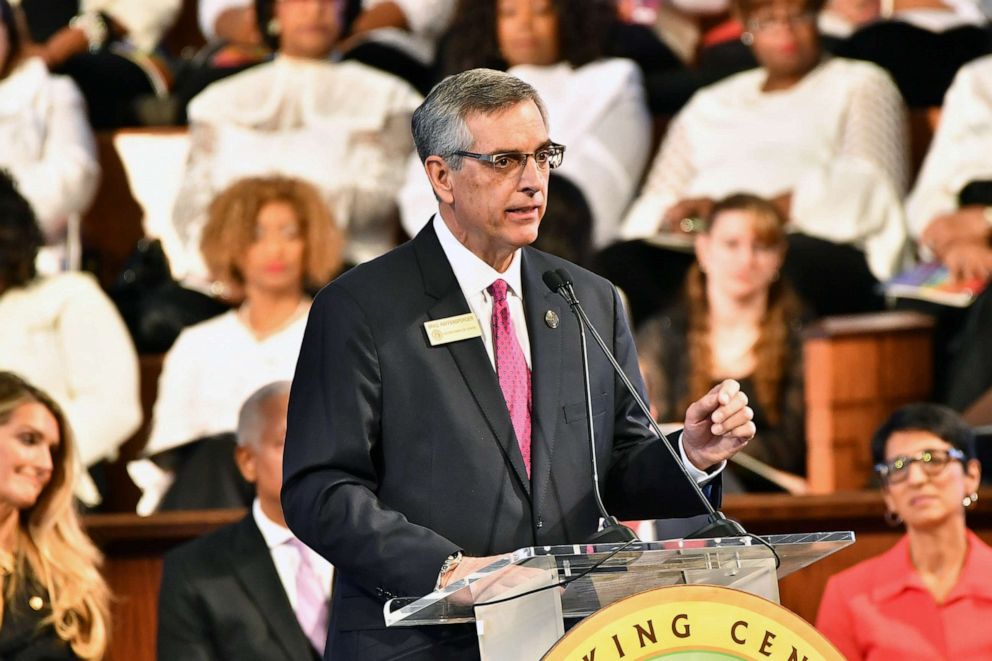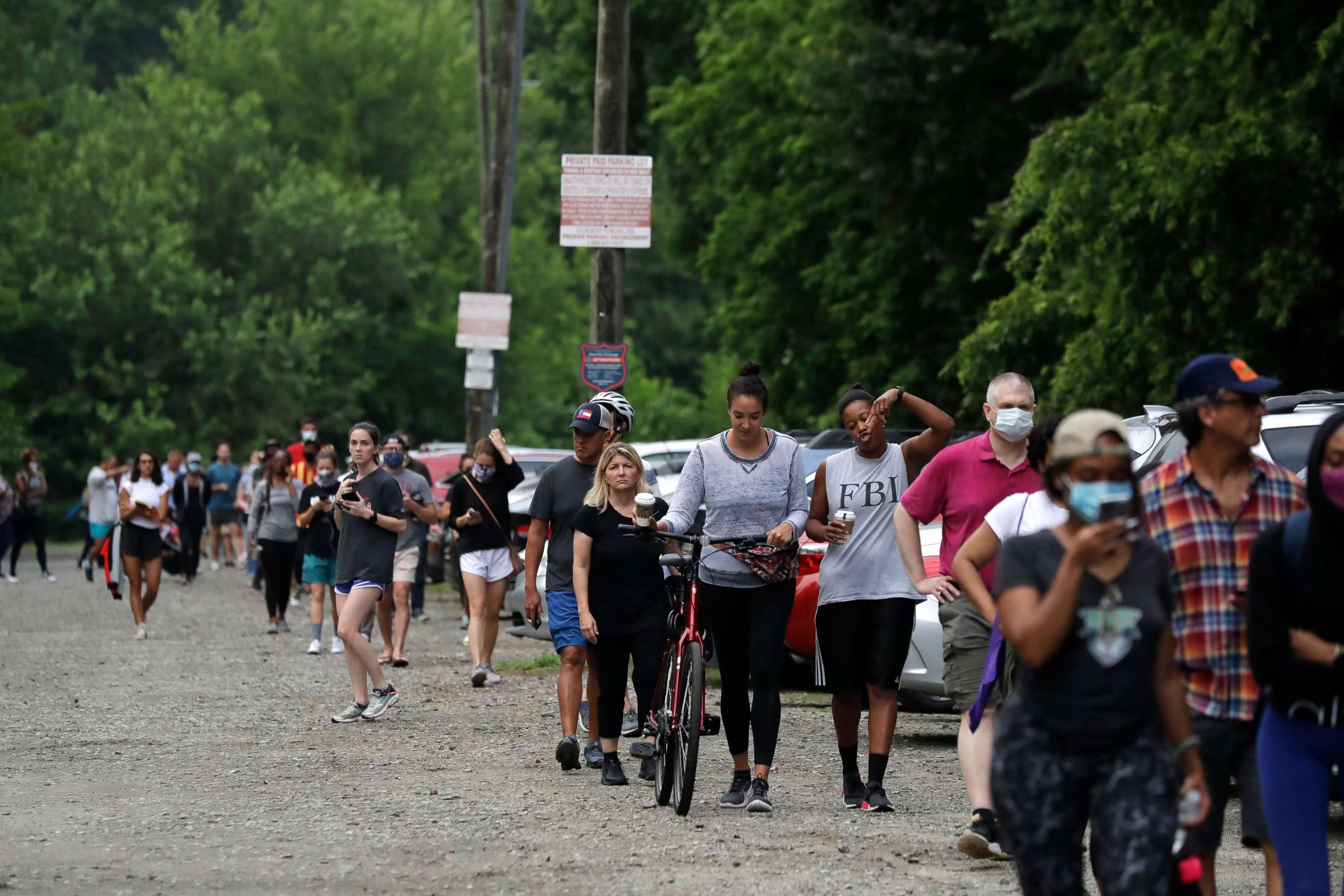Georgia secretary of state alleges up to 1,000 cases of 'double voting' in primary, runoff elections
None of these cases have been fully investigated or tried.
Georgia's top election official said Tuesday that there were up to 1,000 potential instances of voters casting two ballots -- one by absentee ballot and one in person on election day -- across about 100 counties during the June presidential and statewide primaries and the August runoff elections.
"Let me be clear: It is a felony to double vote in Georgia, and we prosecute. ... A double voter knows exactly what they're doing, diluting the votes of each and every voter ... that follows the law. Those that make the choice to game the system are breaking the law, and as secretary of state, I will not tolerate it," Secretary of State Brad Raffensperger, a Republican, said, adding that his office will work to prevent this from happening in November, but not detailing exactly how he plans to do that.
Raffensperger said that his office will be turning the suspected cases over to the state attorney general, local district attorneys and also federal prosecuting attorneys, should they want to take on these cases. He called double voting a "serious felony," noting that if convicted, voters who cast two ballots face a minimum sentence of one year in prison, and a maximum sentence of 10 years in prison, plus up to a $100,000 fine.
The secretary asserted that "there's no excuse under the law for double voting," ending his news conference by specifically saying that "intentionality is not an excuse under the law." However, several election experts were skeptical of this many instances of doubling voting, and noted that poll worker data input errors or administrative failures, like wrongly issuing a regular ballot to a voter instead of a provisional one, could lead to this happening.
He said that "some of those (votes) did show up in election results," which had to be certified within 17 days of each election, but that the votes did not impact the outcomes of any elections. Asked for clarification about whether all the alleged double votes were counted, Walter Jones, a spokesperson for the secretary, said that the investigation is ongoing and will look into "whether two votes were counted for the same individual."
Raffensperger repeatedly asserted that these voters "knew what they were doing," and that this was not the result of a system failure, but he did not provide any evidence to back that claim. None of these cases have been fully investigated or tried.
"It's not the system. It was the county election officials, but also it was the voters knowing what they're doing, and then putting pressure on them and taking advantage of the system -- the protocols that the counties had in place," he said. "But it's really the voter that bears responsibility for that. They mailed back their ballot, they knew that they had a ballot that was back. They knew what they were doing."

However, when pressed on how he could know these alleged double voters' motivation, Raffensperger said that was why investigations would be conducted, and cited one voter whom he said "was bragging about it down in Long County." No additional evidence of the alleged voter fraud was outlined during the press conference.
States have moved to make voting by mail more accessible as the coronavirus pandemic continues in the United States, and as that's played out, President Donald Trump has been claiming -- without evidence -- that mass mail-in voting will lead to widespread voter fraud. It's an accusation that election officials have repeatedly said is unfounded.
Michael McDonald, a political science professor at the University of Florida whose expertise is in American elections, was skeptical of the secretary's claims of that many cases of double voting. McDonald is involved in litigation with Fair Fight Action against the secretary of state's office, but that litigation does not involve Tuesday's announcement.
"We've seen these allegations many times before, in different guises over the years where there are sensational allegations of vote fraud and then upon further investigation, the allegations unravel," McDonald told ABC News. "It may yet be that there are a few people who voted twice. ... But these sensationalistic numbers that you get at the initial stages of an allegation, like 1,000 people double voting -- they almost never hold up upon closer examination."
On Twitter, McDonald pointed to a report from ProPublica and the Atlanta Journal Constitution about how law enforcement records ultimately discredited allegations made by former Secretary of State Brian Kemp, who is now the governor, just two days before the 2018 gubernatorial election, in which he was the Republican candidate. Kemp alleged that the state Democratic Party had been involved in an unsuccessful attempt to hack the state's voter registration files, which was untrue.
Scott Hogan, executive director for the Democratic Party of Georgia, accused Raffensperger of promoting "conspiracy theories and disinformation."
"Voter fraud continues to be extremely rare in Georgia, and any implication otherwise undermines our elections," Hogan said in a statement. "It is clear that rather than do his job of promoting the safety and security of our voting process, the Secretary of State is instead pushing the GOP’s voting conspiracy theories and disinformation, as he fights in court to make voting by mail less accessible to voters."
Raffensperger's announcement was also slammed by Georgia’s Voter Empowerment Task Force, a group backed by several organizations, including Stacey Abrams' voting advocacy group Fair Fight Action, the Georgia NAACP and Black Voters Matter.
"Secretary Raffensperger’s grandiose press conference was a deliberate distraction from his failures to do his job. Under his so-called leadership and the ‘meltdown’ of an election over which he presided, Georgians faced barriers in casting their votes and having their votes counted," the group said in a statement. "Now, unsurprisingly, Georgia’s failed top elections official has decided to push a right-wing narrative spreading across the country rather than focusing on protecting the Constitutional rights of every Georgian."
At the news conference, Raffensperger was also pressed on how -- if the system was working -- someone could successfully cast an absentee ballot and vote in person.
"During Election Day, it gets to be very hectic, and as you're juggling the many balls of many voters, if you don't go back -- back to the system and check it off, then that's how that would actually get through, and so it wasn't recorded at the precinct level," Raffensperger said.
That is in line with what Amber McReynolds, an expert in election administration, told ABC News. She said that if these instances of alleged double voting pan out, it is likely due to a procedural failure.
"My guess is it's a process problem because what should happen -- especially in the state where you have to request a ballot -- is that if you show up and they can't determine if you've returned that ballot, you vote a provisional (ballot). So if (poll workers) were letting them vote an in-person ballot without going through that process, then that is a process problem more than anything," said McReynolds, the CEO of the National Vote at Home Institute, who served as the head of elections in Denver when Colorado transitioned to being a state that conducts all elections predominantly by mail.
She continued, "When you think about risks and elections, when you have all of this field process stuff happening at polling places, and different people in charge at each one of them, you run the risk of poll workers not following procedures. As best I can tell, that's what this is -- poll workers made mistakes."
Normally, only about 5% of Georgia voters cast absentee ballots, but there was a significant increase in voters casting ballots this way, especially for the primary, when the secretary's office proactively mailed applications to all 6.9 million active voters to request an absentee ballot. McReynolds's organization had been advising Raffensperger's office about best practices for scaling up the absentee ballot system, she previously told ABC News.
For the general election, there could be nearly 50% of votes cast via absentee ballot, Raffensperger said in his press conference, adding that already, about 900,000 voters have requested one.
McDonald, the Florida professor, told ABC News Tuesday that he and fellow researchers had examined data from Georgia's June primary, and classified all the reasons that voters' ballots had been rejected or cancelled, and they found that there were nearly 70,000 voters who, according to their analysis, were issued an absentee ballot, but then voted in person. However, there was no uniformity in the how that data was entered, even within counties, he said, and there were over 1,000 unique reasons cited for this particular issue -- that they voted in person after requesting an absentee ballot.

He said if a voter did go to vote in person after mailing back an absentee ballot, the systemic checks should prevent both ballots from being counted.
It's possible, he said, that voters who were concerned their absentee ballots wouldn't arrive in time to be counted could have shown up at the polls to vote in person, and could have even specifically said that to election officials on site -- but that situation could have gone unnoted in the system.
"You're really at the mercy of somebody who's just doing this data entry to make a notation correct, that would have described the voter's situation. If they fail to properly cancel the ballot -- they don't enter it into the system properly -- that could also lead to the appearance that the voter is ... intentionally trying to vote twice, when in fact, they're just concerned about their situation and are trying to make sure that their vote is actually, indeed counted. That's why whenever we have these allegations, law enforcement needs to follow up on them," McDonald said.
More than once last week, Trump seemed to encourage his supporters to try to vote twice in the November election.
"On Election Day or early voting, go to your polling place, even though you've mailed (your ballot) in. Go to your polling place to see whether or not your mail in vote has been tabulated or counted. If it has, you will not be able to vote because it's going to be counted. You'll not be able to vote and the mail in system worked properly as it should. But there's a big chance that it won't work properly," Trump said during a "tele-rally" for North Carolinians on Friday.
After he first made similar comments while in North Carolina on Wednesday, the executive director of North Carolina's State Board of Elections, issued a statement, telling voters not to do this.
"The State Board office strongly discourages people from showing up at the polls on Election Day to check whether their absentee ballot was counted. That is not necessary, and it would lead to longer lines and the possibility of spreading COVID-19," said Karen Brinson Bell.
In at least 40 states, voters have a way to track their mail ballots to ensure they are received by election officials.




